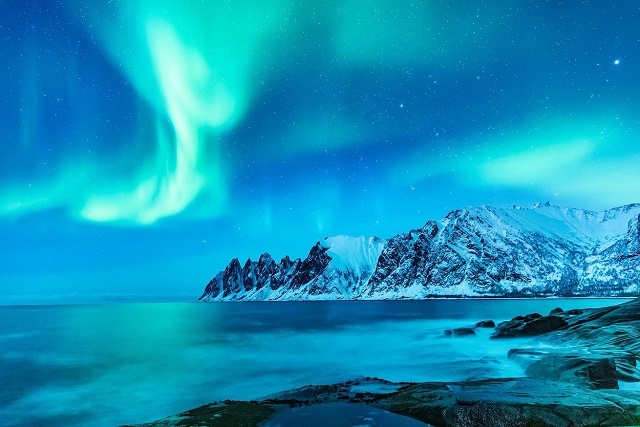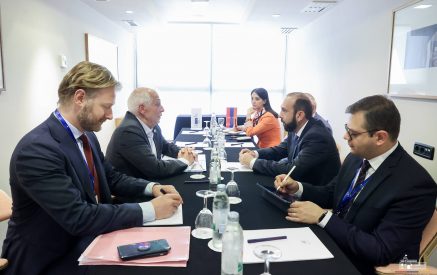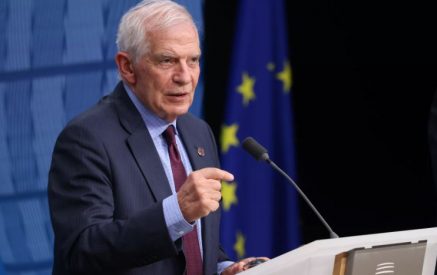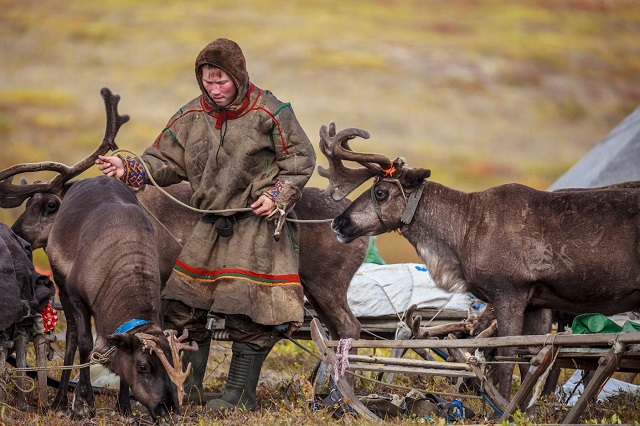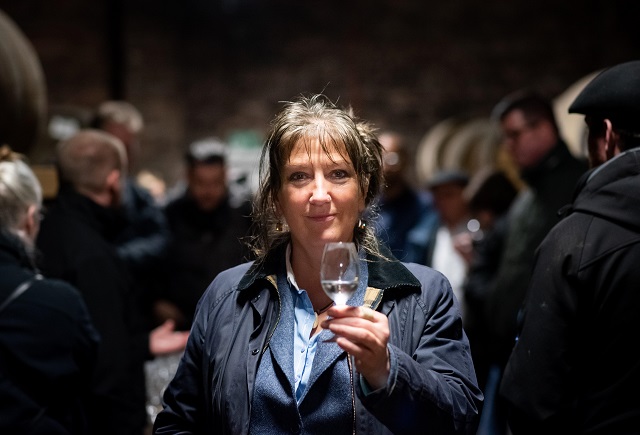The situation in the Arctic has changed dramatically in recent years, so much so that last year saw temperatures of up to 38 degrees in some Arctic regions. The ice is melting and permafrost is thawing at extraordinary speed. High temperatures have also brought wild fires, and thawing permafrost is causing infrastructure to crumble, most likely causing the diesel spill in Siberia last Summer. Melting sea ice has also opened up potential new sea routes however, and eased potential access to oil and gas reserves. This in turn has increased geopolitical interest in the Arctic.
Building Bridges(link is external) is the title of this year’s Arctic Frontiers Conference, a recognition of the strength that is gained by safeguarding the Arctic as a region of peace and a global example of cooperation in an age of growing tensions and worldwide uncertainty. Arctic Frontiers 2021 brings together decision makers, indigenous leaders, business and youth representatives to discuss the most pressing issues facing the Arctic. EU High Representative Josep Borrell participated in the second day of the conference that focused on ‘Building the Future’. Virginijus Sinkevičius, Commissioner for Environment, Oceans and Fisheries, participated on day four in a panel on the circular economy.
The European Union is committed to working with our international partners to make sure that the Arctic remains a stable, safe, peaceful and prosperous place.
“We believe that a safe, stable, sustainable, peaceful and prosperous Arctic is important not just for the Arctic itself, but also for the European Union and actually the whole world,” says Borrell. “The EU is in the Arctic and we have both strategic and day-to-day interests in Arctic matters.”
Read also
EU Envoy for the Arctic, Michael Mann, echoes the High Representative’s words, adding that “We have three Member States, the Kingdom of Denmark, Sweden and Finland that are Arctic states. We are consumers of a great number of products that come from the Arctic. Fish, oil, gas… And in the future, particularly for the green transition, a number of minerals found in the Arctic will also be important.”
The Arctic is a key example of why we need multilateral cooperation, as many issues affecting the Arctic regions can be more effectively addressed through regional or multilateral cooperation.
“Many of these issues are of fundamental relevance for geopolitical dynamics, for wider security concerns and for climate change – which regardless of the current pandemic remains probably the biggest global challenge that humanity is facing,” said Borrell.
There is a lot of attention on hard security issues and on great power competition for resources. Most tensions in the Arctic are, however, believed to be primarily linked to global geopolitical positioning. Arctic safety and security issues are relevant, but must be seen in a broader context.
Climate change is clearly the biggest threat the Arctic is facing. With the European Green Deal, the EU is pushing hard to reform its internal policies and to reach effective multilateral agreements to achieve carbon neutrality by 2050. “But the EU accounts for only 7% of global emissions and we want to work with all our partners around the world, and not least the Arctic States, to reach the aims of the Paris Agreement,” explains the EU High Representative.
“What better illustration is there of the need for the Green Deal than what is happening in the Arctic?”, said Michael Mann.
Those living in the Arctic regions, in particular the indigenous peoples and the younger generation, know best why this is relevant and how important and difficult it is to balance these aims with the retention of jobs and benefits from economic activity in their regions.
The EU High Representative Josep Borrell concludes his intervention by recalling that the European Union is updating its Arctic policy this year, focusing on three key aims:
- to preserve the Arctic as a region of peaceful cooperation;
- to slow the effects of climate change;
- to support the sustainable development of Arctic regions to the benefit of future generations.
A closer look at the Arctic
In this video message Michael Mann explains further why the Artic matters to the EU and to the world, and also speaks about his role as the EU’s Arctic Ambassador. Learn more about the Arctic in his recent interview with Geopolitique.eu
Stories from the Arctic
– Arctic Smartness in Lapland
Arcticness is a natural part of everyday life in Lapland. The people living in Lapland have adapted themselves and their activities to their environment and surrounding nature with a goal of becoming high level experts in Finland and in the EU on sustainable development of the northernmost regions. Smart and arctic knowledge, sustainable utilisation of natural resources and strong communities are the evolving competitive advantages of Lapland. Lapland is a melting pot of industries and it is one of Finland’s fastest growing regions with its backbones in forestry, mining, metallurgy and tourism.
“Lapland’s Arctic Smartness concept gives a shining example of how regions may successfully enhance their development activities and utilisation of EU resources. Dedication, cooperation across different sectors and strong common vision are the key ingredients,” said Kari Aalto, Director, East and North Finland EU Office. Read more(link is external)
– Indigenous Peoples’ knowledge put to practice
Using their traditional knowledge(link is external) a reindeer herding community in Sweden mapped a 350km long reindeer movement route(link is external) from the coast of Bay of Bothnia to Scandinavian mountains on the Norwegian-Swedish border. They provided the necessary basis for the planning of the North Bothnia train line and negotiated the construction of ecoducts (link is external)(reindeer over-passes) on the E4 highway, which crosses this natural reindeer route. The Swedish Traffic Association also trained its staff in reindeer herding issues. Read more(link is external)
– MOSAiC expedition reaches the North Pole
On 19 August 2020, the world’s largest and longest polar research expedition – known as MOSAiC (Multidisciplinary drifting Observatory for the Study of Arctic Climate) – reached the North Pole. In September 2019, the German research icebreaker set sail from Tromsø, Norway, to spend a year drifting through the Arctic Ocean – trapped in ice. After leaving the ice floe it had been sitting in for the previous ten months, the icebreaker travelled through the Fram Strait and along the northeast coast of Greenland – a region that is usually home to thick, multi-year ice. Using radar satellite imagery and sea-ice data, researchers on board the vessel determined that the ice conditions this year were ‘lighter than usual’ and were able to complete their journey to the North Pole in just six days.
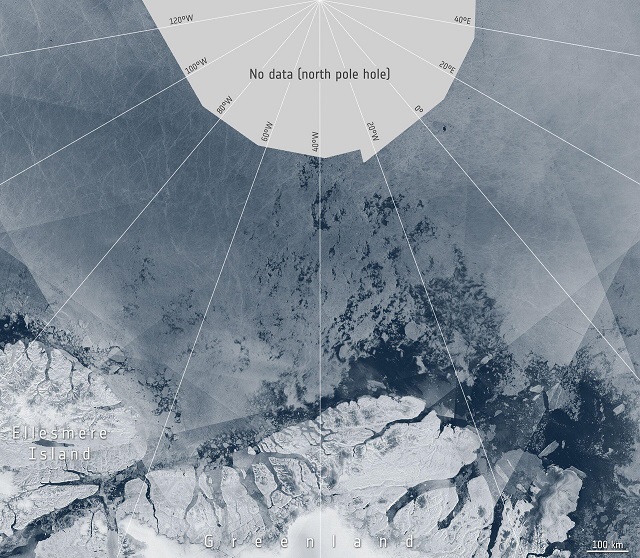
This image shows the Arctic sea ice conditions north of Greenland captured by the Copernicus Sentinel-1 mission(link is external) on 14 August 2020
“Even though the conditions on the ice have been quite challenging due to the unusual weather conditions faced this year, first results have already revealed that warming events and associated changes of the snow surface can lead to an underestimation of the ice concentration – a major variable when studying the Arctic conditions,” explained Tânia Casal, Scientific Campaign Coordinator for the MOSAiC. Read more(link is external)
– In and beyond the Arctic: W-POWER and Whisky Online in COVID crisis
Artic-based W-Power(link is external) started in 2018 to overcome the challenges of remoteness and rurality faced by women entrepreneurs in sparsely populated areas, including Arctic and peri-Arctic areas such as Lapland, North Karelia, Northern Sweden, Scotland, Northern Ireland and Ireland, encouraging these women to set-up, develop and grow their businesses. But COVID-19 demanded a rethink of the project’s approach to face new challenges.
Rachel MacNeill of Islay Whisky Academy, has had to halt her bespoke face-to-face whisky experiences on Islay. She has branched out instead into a new online whisky course (WHISKY AFFINITY ©) “The W-Power network has been a lifeline, before and since the COVID lockdown. It has helped me develop my approach to social media and online marketing. I do it all from home and it works around me,” Rachel said. Read more
European Union
A sustainable, peaceful and prosperous Arctic is important - for the Arctic itself, the EU and the whole world.
— Josep Borrell Fontelles (@JosepBorrellF) February 2, 2021
My intervention @arcticfrontiers conference "Building Bridges" on why EU engagement in Arctic is key for our foreign policy.#ArcticFrontiers https://t.co/Zz9WTasV4O pic.twitter.com/7Q9GiZhpZe



















































